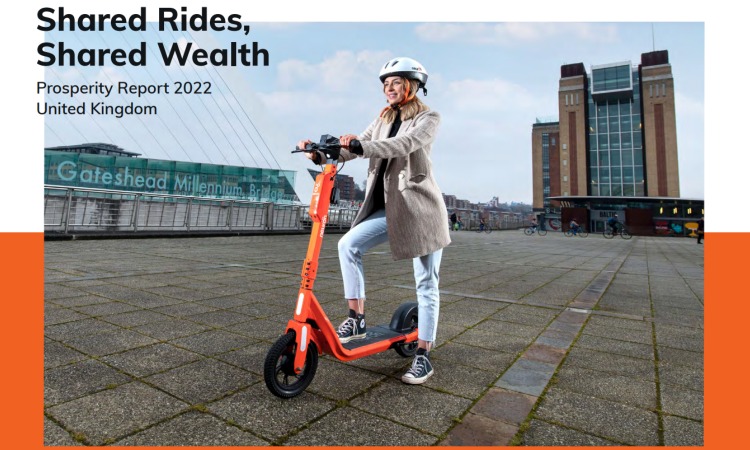Neuron’s latest research highlights economic benefits of e-scooters in the UK
- Like
- Digg
- Del
- Tumblr
- VKontakte
- Buffer
- Love This
- Odnoklassniki
- Meneame
- Blogger
- Amazon
- Yahoo Mail
- Gmail
- AOL
- Newsvine
- HackerNews
- Evernote
- MySpace
- Mail.ru
- Viadeo
- Line
- Comments
- Yummly
- SMS
- Viber
- Telegram
- Subscribe
- Skype
- Facebook Messenger
- Kakao
- LiveJournal
- Yammer
- Edgar
- Fintel
- Mix
- Instapaper
- Copy Link
Posted: 17 October 2022 | Intelligent Transport | No comments yet
According to Neuron Mobility’s new research, 70 per cent of all e-scooter journeys result in a purchase at a local business, with every vehicle contributing over £11,000 to the UK’s local economies each year.


Credit: Neuron Mobility
Neuron Mobility has released new research highlighting the economic benefits that rental e-scooters have on towns and cities in the UK. During their trips, riders have been found to cumulatively spend £14.9 million a year across the three locations where Neuron operates in the UK, including Newcastle, Slough and Sunderland, with Newcastle’s economy alone seeing an injection of £8.9 million a year.
According to the findings, each e-scooter contributes £11,500 to local economies a year. For the first time, the research goes deeper to determine that 50 per cent of riders spent more than £10 on their most recent trip, with an average of £17.30 per trip.
Rider surveys, carried out in July 2022, demonstrate that seven in 10 e-scooter journeys in the UK result in a purchase with a local business, and 10 per cent of trips wouldn’t have happened at all if the e-scooters were not available, meaning local businesses would have missed out on valuable sales. When asked where they spend money during their e-scooter trips, 37 per cent said that they made purchases at shopping venues, 35 per cent at a restaurant or café, and 18 per cent at an entertainment venue like the gym or a local event.
The data comes from a newly launched Prosperity Report 2022 (UK) from the operator, titled ‘Shared Rides, Shared Wealth‘, which outlines the positive impact rental e-scooter schemes are having on local prosperity in the UK. The report shows that 97 per cent of riders surveyed believe that Neuron has benefited their city and also improved mobility, air quality and congestion.
Most riders said that they used e-scooters for leisure and recreation (62 per cent), while many also made purposeful journeys like commuting to work or school (38 per cent), running errands such as shopping (29 per cent) and getting to appointments (19 per cent).
The report also considered how rental e-scooters have helped to make cities more liveable and attractive to inward investment. In Newcastle, e-scooters are proving to be an essential part of the transport mix, serving as a first- and last-mile solution to fill gaps in the city’s wider public transport network. E-scooters have also been found to support local economies through working with local business networks to enhance visitor experiences and improving access to key tourist and leisure destinations.
Neuron is also committed to providing long-term and future-proof employment opportunities for the communities it operates in, helping local staff to upskill and gain vital experience in a growing industry and creating hundreds of job opportunities, all at certified National Living Wage. The operator has also rolled out the UK’s first e-scooter apprenticeship scheme, giving local college students the opportunity to get a head start in the field of micro-mobility and gain valuable new skills to help them with their studies and future careers.
Cormac Quinn, UK Regional Manager at Neuron Mobility, said: “The data shows our e-scooters are helping to boost local economies and revive the high street, which is certainly welcome, particularly in the wake of the COVID-19 pandemic. However, our work doesn’t stop there and we are committed to helping our towns and cities thrive in the long term. Neuron’s e-scooters have helped make cities more liveable too, providing much needed first and last mile transport options, enhancing local public transport networks and helping to keep cities running 24/7 by providing essential transport to those working night shifts.”
If you liked this, you may also be interested in:
▶ Neuron riders travel 20 million kilometres across Australia
▶ Neuron announces extension of micro-mobility programme in Vernon, Canada
Related topics
Air Quality, Micro-mobility, Mobility Services, Passenger Experience, Staff & Skills Development, Sustainable Urban Transport
Related modes
Bikes & Scooters
Related cities
Newcastle, Slough, Sunderland
Related countries
United Kingdom
Related organisations
Neuron Mobility







